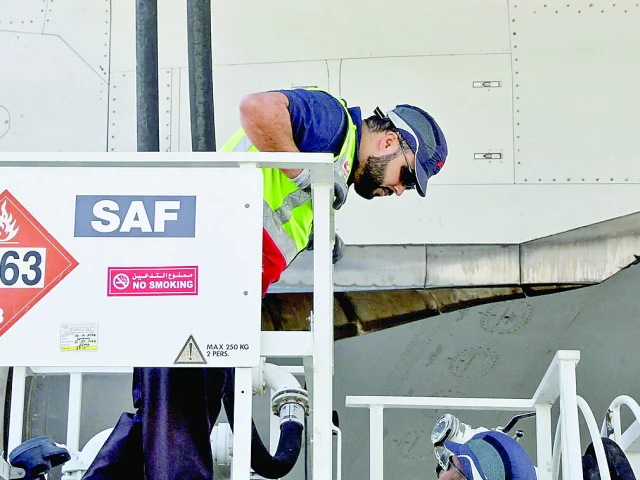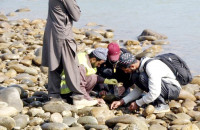'Turn crop waste into SAF'
Experts call for strategy focused on FDI, development, infrastructure, and R&D

Promoting sustainable aviation fuel (SAF) production can help Pakistan boost national energy security, large-scale economic activity, and foreign direct investment while reducing crop waste and air pollution, economic and energy experts and environmental activists said.
They said that Pakistan is uniquely positioned to harness its abundant agricultural resources and establish itself as a key player in SAF production. By leveraging its vast agricultural base, the country can simultaneously address four critical challenges: enhancing national energy security, stimulating large-scale economic activity, attracting foreign direct investment, and mitigating crop waste and the air pollution caused by its burning.
Speaking with The Express Tribune, they said that globally, nations across various industrial sectors are striving to reduce emissions, and the aviation industry is no exception. As efforts to mitigate the environmental impact of air travel gain momentum, sustainable aviation fuel is emerging as a transformative solution.
They noted that with mandates in the European Union (EU) and the United Kingdom (UK), along with the United States' strategic initiatives driving SAF adoption, Pakistan can capitalise on SAF production while repurposing its crop residues. With global aviation fuel demand exceeding 250 million metric tonnes annually, the shift to SAF presents both a monumental challenge and a transformative opportunity.
SAF is a renewable, low-carbon alternative to conventional jet fuel, produced from sustainable feedstocks such as waste oils, agricultural residues, and non-food biomass.
Commercially, two key technologies dominate SAF production: Hydroprocessed Esters and Fatty Acids (HEFA) and Alcohol-to-Jet (ATJ). The selection of technology depends on the type of biomass available for SAF production. HEFA technology is utilised for lipid-based feedstocks, such as used cooking oil, animal fats, and non-edible vegetable oils, while ATJ technology is best suited for sugar-based feedstocks, such as wheat straw, rice husks, and bagasse waste.
SAF produced through these two technologies provides a "drop-in" fuel that is fully compatible with existing jet engines and infrastructure. An emerging and highly promising third technology involves utilising carbon dioxide as a feedstock, though it is not yet commercially available.
Eminent energy scientist and expert in a circular economy Dr Adeel Ghayur said that commercial SAF technologies offer production capacities ranging from 100,000 tonnes to as much as one million tonnes annually.
He explained that refineries on the higher end of this spectrum require multibillion-dollar investments but have the potential to generate thousands of direct and indirect jobs, boosting economic activity in their regions.
He noted that currently, SAF is priced at approximately $2,500 per metric tonne, significantly higher than conventional aviation fuel, which costs around $700 per metric tonne.
As the international community tightens its regulatory frameworks for sustainable aviation, Pakistan is presented with a unique window of opportunity that represents both an environmental imperative and a tremendous economic prospect.
Crop residues burned during both winter and summer in Pakistan represent an underutilised resource with immense potential for SAF production. In Punjab alone, it is estimated that millions of tonnes of rice residue are burned each winter to prepare fields for the next planting season. Furthermore, additional crop residues become available during the wheat harvest. Together, these biomass resources hold the capacity to support the establishment of multiple SAF refineries, transforming a major environmental challenge into an economic and ecological opportunity.
He said, "The starting point for Pakistan's SAF transformation lies in developing a well-rounded, multipronged strategy focused on attracting foreign investment, equipping local industries with the necessary knowledge, infrastructure, and skills, and fostering the development of robust indigenous research and development (R&D) capabilities. Strengthening R&D is essential for Pakistan to remain competitive in the global SAF market, secure its position as a hub for innovation, and maintain leadership as SAF adoption rises across Asia. This comprehensive policy roadmap will serve as both a blueprint and a catalyst to propel Pakistan to the forefront of the global SAF revolution."























COMMENTS (1)
Comments are moderated and generally will be posted if they are on-topic and not abusive.
For more information, please see our Comments FAQ